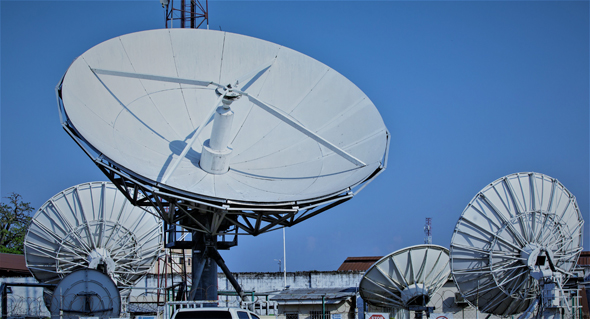Millions remain unconnected to the internet in Africa, and cannot access crucial services such as telemedicine, remote work, and remote learning.
By Yafit Ovadia, CTech
With Israel’s Nimbus project underway, as well as Google’s plans to build a server farm and expand connectivity across the Jewish State, the country will have increased options to improve connectivity locally. Gilat Telecom is an Israeli company aiming to bring some of that connectivity around the world with its satellite, fiber, and cloud offerings. In June, the company, which is part of the Satcom Systems Group, won a tender from the Israel Broadcasting Corporation to transmit the Kan News Channel’s television and radio broadcasts via satellite.
Currently, the corporation distributes two channels using software-defined network technology and eight radio channels via Spacecom’s Amos 17 satellite for space communications. Gilat Telecom has been operating for the past 25 years in the telecommunications sector, offering satellite and fiber-based connectivity solutions, delivering high-quality broadband communication to mobile-network operators (MNOs) and internet service providers (ISPs). The core of its operations are in Africa, particularly the sub-Saharan countries, where it yields 75% of its revenues, and connects some of the most remote locations to the internet; while its remaining revenues come from its operations in Israel.
“We’re a one-stop-shop for all telecom connectivity services, and provide 4G communications to over 30 million consumers in Africa. In Israel, we provide telecom solutions and hardware integration for several branches of the defense sector, such as the Israeli military and the Israel Police, as well as government bureaus,” Gilat Telecom CEO Asaf Rosenheck told CTech in an interview.
Over the past few years, the company has shifted from satellite and fiber services to incorporating cloud computing options too. In Africa, Rosenheck explained, most of the consumer telecom market is dominated by MNOs that use SIM cards on phones or personal WiFi hotspots, as that is how people in Africa consume the internet since crucial infrastructure is often lacking in many locations, particularly in underdeveloped countries. Gilat operates marine subsea fiber cables, satellites in various positions above the Earth, and local-in-country cloud infrastructure via server farms.
Internet service in the Sub-Saharan desert
Currently, Gilat works with communication companies in the Democratic Republic of the Congo, Ghana, Nigeria, Cameroon, Kenya, the Central Africa Republic, Uganda, Chad, Niger, South Sudan, Liberia, and Guinea.
Millions remain unconnected to the internet in Africa, and cannot access crucial services such as telemedicine, remote work, and remote learning, Rosenheck noted, so Gilat works with local parties that are responsible for country-wide distribution. It also strives to provide them at a reduced cost. Currently, the company has Points of Presence (POPs) in several countries, in locations as diverse as Petach Tikva, London, Germany, Ghana, Uganda, and Congo.
Gilat is no stranger to the defense sector as well, and enables sensitive communications for several vendors in that industry. “Our solutions provide maritime, air, and land services with mission-critical voice, video, and high-speed data communications anywhere in the world for enterprises and governments,” said Ami Schneider, who serves as the VP Defense & HLS Division, although the company declined to further elaborate on the matter for security reasons.
Poised above planet Earth
While traditional satellites for telecommunications are located in geostationary orbits (GEO) and do not rotate often, Gilat utilizes them but also employs those located at medium-Earth orbit (MEO) positions, which are most effective in providing services to remote locations. Customers need only install a satellite dish to get service, browse their email, stream Netflix, and more. They also do not require any expensive infrastructure – aside from electricity – which can be obtained from solar panels, a modem, and dish.
Alternately, its GEO satellites are able to power livestream services on moving vehicles, such as news vans, since they remain in one static location in space. “Using low latency satellites provides more stable services, because there are less possible points of failure compared to fiber,” Rosenheck explained, “it’s especially useful in places like in Chad, Niger, and Congo where installing terrestrial connectivity or building cell towers is very expensive since the country is quite large, and we can reach more areas via satellite.”
Cloud computing across the continent
Beginning in 2019, Gilat began offering cloud services to African countries too. Cloud computing has become a necessity, and companies like AWS and Microsoft Azure are taking over the sector. Gilat sells virtual private servers with storage and backup options to MNOs, and its cloud solutions contain disaster recovery as well.
“We offer cloud infrastructure in certain countries, so customers won’t experience delays when connecting to the internet via fiber or satellites,” he explained. The group recently constructed a server farm in Uganda. As to the next countries in the works, Gilat has Congo, Nigeria, South Sudan, and Niger in its sights.
“We’re investing locally in those countries by building server farms, so that hospitals, banks, and other companies can connect right away. Cloud connectivity is more stable, and doesn’t consume expensive resources like fiber and satellites do,” he added.
Financial flexibility
The company first began its path in the 1990s, and went public in 2004 on the Tel Aviv Stock Exchange. Originally, Gilat Satellite – which designs satellite networks – was part of Gilat Telecom, but split off into an offshoot company and is strictly a hardware manufacturer that creates modems and satellite hubs, while Telecom remains a service provider.
In the past, Gilat was owned by the Eurocom Group, whose shareholders held full control. However, since February 2021, the company has remained without a single controlling shareholder and is able to operate more freely.
As to Gilat’s and other Israeli satellites companies’ success, Rosenheck relayed that Israel’s closer geographic location to Africa helps it easily build better infrastructure as well as understand local needs. “We’re agile and flexible and can adjust ourselves to the rapid changes in the market. We market better to African countries, because we can intuit what they need.”




